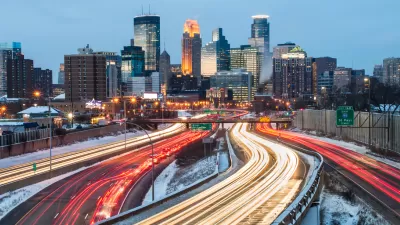Part 4 of this multi-part series on the 5-year anniversary of the August 1, I-35W bridge collapse by David Levinson, U. of Minnesota Professor of Civil Engineering, deals with the three vetoed gas tax measures before and after the bridge collapse.
August 1, 2007: The I-35W bridge over the Mississippi River collapsed at 6:05 PM. Thirteen people died, 145 were injured.
In an analysis perhaps like none other, Univ. of Minnesota Civil Engineering Professor David Levinson, became intimately involved in what clearly is one of the country's worst transportation infrastructure calamities caused ultimately, and arguably, by human engineering error as opposed to an "act of God", as was the case in the 1989 Loma Prieta collapse of the San Francisco Bay Bridge.
While Levinson acknowledges that "(t)hrowing money at the Bridge would not have kept it from falling. Others note money could have bought:
- more inspections,
- structural (e.g. finite-element) model of the Bridge,
- better, faster repairs,
- the ability to replace the Bridge sooner."
In Part 4 of the on-going Bridge series, Levinson focuses on Gov. Tim Pawlenty's three vetos of the state legislature's passage of an increase in the gas tax. The first veto was in 2005; the second was on May 15, 2007 that was combined with an "income-tax-for-property-tax swap".
"Tim Pawlenty had already vetoed (in 2005) a legislature-passed increase in the gas tax that could have raised money to repair bridges like this one. The latest (May 15, 2007) vetoed (a 7.5-cent) gas tax would not have solved this problem, but previous taxes that were not passed (due in part to Pawlenty's previous veto threat) may have, had the money been spent on this kind of thing."
"The gas tax had not been raised in Minnesota since 1988, and thus its purchasing power had diminished significantly, while the network was expanded and aged, and traffic levels increased. Pawlenty's campaign took pride in this veto..." (In 2002, Pawlenty had signed the Taxpayers League of Minnesota's no new taxes pledge).
Ultimately, in 2008, Minnesota's gas tax was raised through a bipartisan legislative vote that overrode a Pawlenty veto, and proved to be politically costly for Republicans who crossed party lines.
Thanks to Angie Schmitt
FULL STORY: The Fall and Rise of the I-35W Mississippi River Bridge – Part 4: Politics

Alabama: Trump Terminates Settlements for Black Communities Harmed By Raw Sewage
Trump deemed the landmark civil rights agreement “illegal DEI and environmental justice policy.”

Study: Maui’s Plan to Convert Vacation Rentals to Long-Term Housing Could Cause Nearly $1 Billion Economic Loss
The plan would reduce visitor accommodation by 25% resulting in 1,900 jobs lost.

Planetizen Federal Action Tracker
A weekly monitor of how Trump’s orders and actions are impacting planners and planning in America.

Wind Energy on the Rise Despite Federal Policy Reversal
The Trump administration is revoking federal support for renewable energy, but demand for new projects continues unabated.

Passengers Flock to Caltrain After Electrification
The new electric trains are running faster and more reliably, leading to strong ridership growth on the Bay Area rail system.

Texas Churches Rally Behind ‘Yes in God’s Back Yard’ Legislation
Religious leaders want the state to reduce zoning regulations to streamline leasing church-owned land to housing developers.
Urban Design for Planners 1: Software Tools
This six-course series explores essential urban design concepts using open source software and equips planners with the tools they need to participate fully in the urban design process.
Planning for Universal Design
Learn the tools for implementing Universal Design in planning regulations.
Caltrans
Smith Gee Studio
Institute for Housing and Urban Development Studies (IHS)
City of Grandview
Harvard GSD Executive Education
Toledo-Lucas County Plan Commissions
Salt Lake City
NYU Wagner Graduate School of Public Service




























